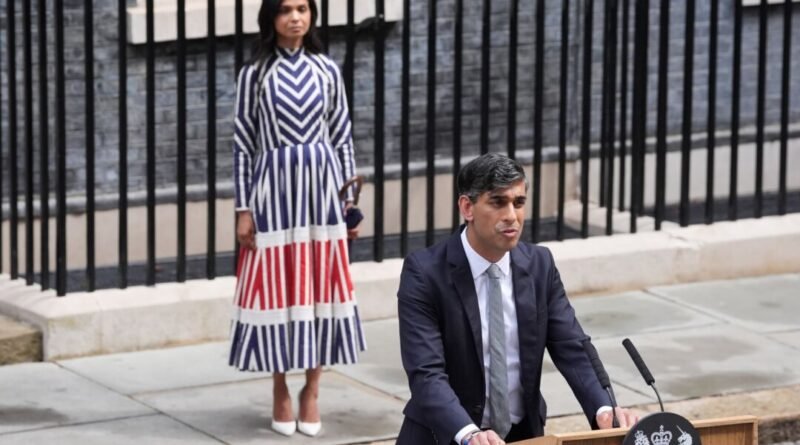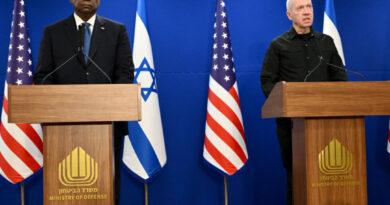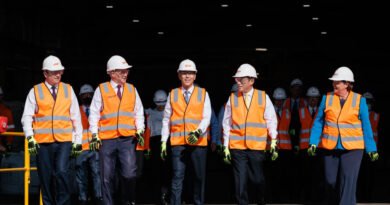Sunak to Step Down as Conservative Leader After Labour Secures Landslide Victory
The former prime minister managed to hold onto his seat, but 250 Tory colleagues were lost in a disastrous night for the party, setting the stage for a leadership battle.
Rishi Sunak announced his resignation as party leader, apologizing for leading the Conservatives to their worst-ever election result as Sir Keir Starmer swept into No. 10 Downing Street with a Labour landslide.
The former prime minister, who secured his seat but saw 250 colleagues defeated, confirmed that he will step down as Tory leader once the process of selecting his successor begins, potentially sparking new Conservative infighting as remaining MPs scramble to replace him.
Today, Sir Keir became the country’s seventh Labour prime minister and only the fifth to win a general election after a disastrous night for the Tories that resulted in former prime minister Liz Truss and a dozen serving Cabinet members losing their seats.
Speaking outside No 10, with his wife Akshata Murty by his side, Mr. Sunak stated: “I will soon be resigning as prime minister to His Majesty the King.
“To the nation, I want to express my sincerest apologies.
“While I have devoted all my efforts to this role, your message is clear that a change must come to the Government of the United Kingdom. Your judgment is the most crucial factor.”
“I have heard your frustration, disappointment, and I accept responsibility for this defeat.”
‘A Difficult Day’
As the morning progressed on Wednesday, with 648 of the 650 Commons seats declared, Labour had a majority of 176, winning 412 seats while the Conservatives had 121.
Mr. Sunak emphasized: “Following this outcome, I will resign as party leader—not immediately, but once the process for selecting my replacement is established.
“It is crucial that, after 14 years in power, the Conservative Party focuses on rebuilding and also fulfills its crucial role in an effective and professional opposition.”
He concluded: “This is a challenging day at the end of several difficult days. However, I depart from this role with gratitude for having served as your prime minister.
“This country is exceptional, and it is all thanks to you, the British people, the true foundation of all our accomplishments, our strengths, and our greatness.”
After his address at Downing Street, Mr. Sunak proceeded by car to Buckingham Palace to formally resign as prime minister before Sir Keir was invited to establish a government.
His resignation came after a dramatic night in which Ms. Truss narrowly lost to Labour in Norfolk South West, where she had been defending a significant majority of over 24,000.

Twelve Cabinet Ministers Defeated
Twelve ministers from the Cabinet failed to retain their seats, surpassing the previous record of seven in 1997 during Sir Tony Blair’s victory.
Commons Leader Penny Mordaunt, Defence Secretary Grant Shapps, Welsh Secretary David TC Davies, Transport Secretary Mark Harper, Attorney General Victoria Prentis, and Veterans Minister Johnny Mercer all fell to Labour candidates.
Education Secretary Gillian Keegan, Justice Secretary Alex Chalk, Science Secretary Michelle Donelan, Culture Secretary Lucy Frazer, and Illegal Immigration Minister Michael Tomlinson were defeated by the Liberal Democrats, who, despite a resurgence, won 71 seats—placing behind Reform in total votes received.
Chief Whip Simon Hart was defeated by Welsh nationalist party Plaid Cymru in Carmarthen West and South Pembrokeshire, with the Tories completely eliminated in Wales.
Conservative Deputy Chairman Jonathan Gullis and former cabinet minister Sir Jacob Rees-Mogg were also defeated by Labour candidates.
Survivors from the Tory party included party chairman Richard Holden, who narrowly held on in Basildon and Billericay, and outgoing Chancellor Jeremy Hunt, who fended off a challenge from the Lib Dems in Godalming and Ash.
Former Labour leader Jeremy Corbyn managed to retain his seat in Islington North as an independent, defeating his former party in the constituency he has represented since 1983.
Other Labour losses included shadow paymaster general Jonathan Ashworth, who lost his Leicester East seat to pro-Palestinian independent Shockat Adam.
Reform UK leader Nigel Farage won his Clacton seat on his eighth attempt to enter Parliament and promised his party would “astonish everyone” as it gained four seats and finished third in the popular vote.
The Greens secured four seats, including the newly created Bristol Central won by co-leader Carla Denyer, who defeated Labour’s shadow culture secretary Thangam Debbonaire.
In Northern Ireland, Sinn Fein maintained its seven seats, making it the largest parliamentary party in the region, although its MPs do not sit in the Commons due to their Irish republican beliefs.





